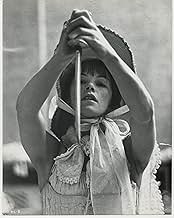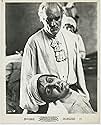IMDb RATING
7.5/10
2.8K
YOUR RATING
In an insane asylum, Marquis de Sade directs Jean Paul Marat's last days through a theater play. The actors are the patients.In an insane asylum, Marquis de Sade directs Jean Paul Marat's last days through a theater play. The actors are the patients.In an insane asylum, Marquis de Sade directs Jean Paul Marat's last days through a theater play. The actors are the patients.
- Awards
- 2 wins & 1 nomination total
Robert Langdon Lloyd
- Jacques Roux
- (as Robert Lloyd)
Featured reviews
When Marat/Sade was first shown--those of us used to the traditional Hollywood film entertainments were just stunned. What a tour de force of acting, story, makeup, style, filming and music. We didn't know what to make of it. On the one hand it was the scariest, most disturbing film we had seen, on the other
hand it was a grand entertainment with absolutely intriguing characters. Was it historically accurate? Is it a dream? Was that really supposed to be the
Marquis de Sade up on the screen? The film has amazing bookends: The
opening film credits appearing in complete silence one word at a time and then disappearing one word at a time, has to be sort of a classic of film titles-- anticipating the minimalist art movements in the visual arts. Before the film even begins, we are off kilter, completely disoriented. The horrifying ending at the time was a shocker. One is really unprepared for this spectacular brutality--and the fact that it just ends in the midst of the chaos with zero resolution again is totally disorienting. This remains a great film--with some of the most amazing acting ever caught on screen. For most of us here in the U.S., it was the first time we saw Glenda Jackson. Her voice, her presence, her amazing acting
technique--she became instantaneously recognized as one of the great screen
actresses. And sure enough shortly thereafter, she won her two academy
awards. If you enjoy great theatre, and great film treatments of theatrical
material--this film is simply not to be missed.
hand it was a grand entertainment with absolutely intriguing characters. Was it historically accurate? Is it a dream? Was that really supposed to be the
Marquis de Sade up on the screen? The film has amazing bookends: The
opening film credits appearing in complete silence one word at a time and then disappearing one word at a time, has to be sort of a classic of film titles-- anticipating the minimalist art movements in the visual arts. Before the film even begins, we are off kilter, completely disoriented. The horrifying ending at the time was a shocker. One is really unprepared for this spectacular brutality--and the fact that it just ends in the midst of the chaos with zero resolution again is totally disorienting. This remains a great film--with some of the most amazing acting ever caught on screen. For most of us here in the U.S., it was the first time we saw Glenda Jackson. Her voice, her presence, her amazing acting
technique--she became instantaneously recognized as one of the great screen
actresses. And sure enough shortly thereafter, she won her two academy
awards. If you enjoy great theatre, and great film treatments of theatrical
material--this film is simply not to be missed.
I just watched the MGM DVD, which is a fine letterboxed transfer. (I also saw the movie a few years after it was released.)
Marat/Sade is an amazingly original and stunningly powerful philosophical and psychological descent into one of the most complex periods of recorded history, the French Revolution, the Terror that ensued, and the rise of Napoleon and his empire. The multi-layered ideas come thick and fast; I had to watch the movie over two nights because there's so much to think about, and some of the words and images are so overwhelming.
Of the Royal Shakespeare Company actors in the film (little known at the time), Glenda Jackson had the most notable subsequent career, but Ian Richardson (Marat) has also done remarkable things (and he's so young here, you may not recognize him).
This is not a movie for casual entertainment, but if you care about history and the deepest questions of good and evil and free will, you'll find much of value here.
Marat/Sade is an amazingly original and stunningly powerful philosophical and psychological descent into one of the most complex periods of recorded history, the French Revolution, the Terror that ensued, and the rise of Napoleon and his empire. The multi-layered ideas come thick and fast; I had to watch the movie over two nights because there's so much to think about, and some of the words and images are so overwhelming.
Of the Royal Shakespeare Company actors in the film (little known at the time), Glenda Jackson had the most notable subsequent career, but Ian Richardson (Marat) has also done remarkable things (and he's so young here, you may not recognize him).
This is not a movie for casual entertainment, but if you care about history and the deepest questions of good and evil and free will, you'll find much of value here.
10moutona
One must read the play and see the background of Peter Weiss in order to get the full feel of this movie. It is absolutely the best presentation of the politics of man and our inability to ever resolve the major issues of our existence. Peter Weiss has fully captured the unending struggle between the politics necessary to obtain freedom versus that which enslaves. The best parts are the discussions between Sade and Marat as to the results of freedom versus dictatorship and capitalism versus socialism. The entire story provides a voyage through the human comedy and shows the inability of humanity to ever figure out the real truth of our existence and relationship to each other and our socitey. The result is a better understanding of the sinusoidal flow of the give an take of our history.
In an insane asylum, the Marquis de Sade directs Jean Paul Marat's last days through a theater play. The actors are the patients.
Did something like this actually happen? I could imagine the Maquis de Sade putting this sort of thing together, because what else is he going to do with his time? But did they actually allow this? And, of course, the real inmates could not possibly have been such good actors and singers... could they? As others have noted, this film can be enjoyed by anyone but probably has much more significance for those who grasp the politics and philosophy of the French Revolution. To try to fully comprehend the class distinctions and other angles without some background would be a challenge. To say I fully grasped the competing views of the inmates, Sade and the warden would be a lie.
Did something like this actually happen? I could imagine the Maquis de Sade putting this sort of thing together, because what else is he going to do with his time? But did they actually allow this? And, of course, the real inmates could not possibly have been such good actors and singers... could they? As others have noted, this film can be enjoyed by anyone but probably has much more significance for those who grasp the politics and philosophy of the French Revolution. To try to fully comprehend the class distinctions and other angles without some background would be a challenge. To say I fully grasped the competing views of the inmates, Sade and the warden would be a lie.
You do not need to know the details of French history to enjoy (?) this most astonishing and confrontational movie. Remember that this is a cinematic version of a play, and that Director Peter Brooks never loses sight of the physical presence and power that his original stage version was renowned for. Unlike many cinematic treatments of stage drama, this film is essentially theatre - the camera in fact intensifies the claustrophobic setting and puts the viewer in the front row. The performances are uniformly excellent : the intensity and conviction of the cast in their roles is exceptional. This is an emotionally draining, bravura movie that once seen, can not be forgotten.
Did you know
- TriviaCharenton, the asylum depicted in the film, was established in 1645 and still exists and is still in use, although it is now called the Esquirol Hospital (l'Hôpital Esquirol), named for Jean-Étienne Dominique Esquirol, a French psychiatrist who ran the hospital in the 19th Century.
- Quotes
Marquis de Sade: And what's the point of a revolution without general copulation?
- Crazy creditsThe opening credits - the play's title, stage credits and the actors appearing in the film - pop on the screen, one word at a time, until it is filled. The closing credits - the film's production staff - start off with a full screen of words, and they then pop off the screen, one word at a time, until it is completely empty...just as it was when the film began.
- Alternate versionsThe first VHS video release of the film, through Water Bearer Films, includes an expositional opening monologue over the opening titles on black.
- ConnectionsFeatured in Changing Stages (2000)
- How long is Marat/Sade?Powered by Alexa
Details
- Release date
- Country of origin
- Language
- Also known as
- Die Verfolgung und Ermordung Jean-Paul Marats dargestellt durch die Schauspielgruppe des Hospizes zu Charenton unter der Anleitung des Herrn de Sade
- Filming locations
- Production companies
- See more company credits at IMDbPro
Contribute to this page
Suggest an edit or add missing content
































